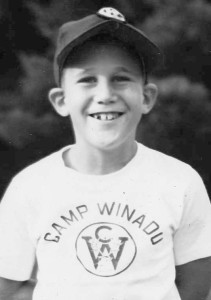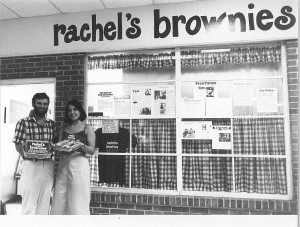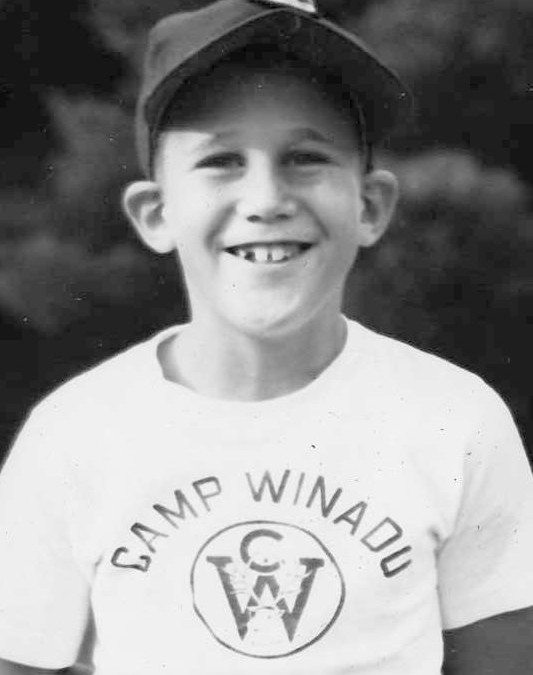 |
| Jeffrey Slater at Camp Winadu in 1965 |
When I was at summer camp in the 1960’s at Camp Winadu, I had an arch competitor named Scott Rogers. He and I were always competing with each other in baseball or in the 50 yard dash. One of us were either #1 or #2 in most sporting events throughout each summer in the Berkshires. I never felt any animosity toward Scott and looking back, I realized he made me a better athlete through his own physical prowess.
 |
| Jeffrey Slater and Ra El Remez in front of Rachel’s Brownies in 1978 in Malvern, Pennsylvania |
In the mid-1980’s when Ra El and I were marketing Rachel’s Brownies, we too had competitor like The Well-Bred Loaf, Mrs. Field’s Cookies, Famous Amos and several other challengers. I never looked at these competitors with disdain or envy. I always thought that they pushed us along to get better at what we did and to help us build the brand we wanted. Once again the competition helped us define our own goals yet pushed us to work harder.
Today it is easy to be hyper critical of your competitors within whatever category you work. I still take have the attitude that I can learn something and improve my own professionalism by being aware of the competitor but not imitating them. My competition helps to define my brand only if I let them. I can fight back by knowing how we can deliver on our own brand promise without always trying to be like the competitors.
 |
| Competitors make you stronger, faster and more agile |
When I think about a competitor, these are the nine questions and thoughts that go through my mind…
1. Just because they do something, doesn’t mean it is smart or right for my brand. Competitors do stupid things for dumb reasons.
2. Instead of getting into a price war with a competitor, what can I do that gives unexpected value that encourages customers to pay a higher price? No one benefits from a price war but my brand can succeed with added value.
3. If your competitor’s brand has a personality, what are the flaws and weaknesses that you want to avoid? Know your competitor’s personality but don’t imitate it- ever. If they zig, can you zag?
4. When your competitor markets their brand, what tone do they communicate to potential clients? Is it sickly sweet, is it arrogant, is it personable, is it boring, is it dynamic? How is the personality of how your brand communicates different and is that difference relevant to our audience?
5. Am I spending too much time worry about their next marketing move and not enough time on my own?
6. What gap is there is their product or service offering that could be highlighted in what we do? If they charge extra for something- could we do it for free? Or, could we bundle together some benefits and sell them as a package?
7. Can I find a unique way to reach my audience that does something valuable for my brand? For example, if my brand is all about our open heart approach to the world, do we allow our employees to volunteer once a month at a shelter? How can we build the emotional breadth of our brand in an important and relevant way to our potential customers?
8. Coke and Pepsi are very different brands yet the actual carbonated products are very similar. The difference is in the emotional reference points we have to one versus another. Is there a way where you can reinforce that difference? (Are your brand colors the same- maybe change them. Are you in the same magazines advertising – do something else with your marketing dollars).
9. Are there ways that testimonials from former customers of your competitor can help you? “I used to buy all my X from Y business but I switched to Z because I was treated like a human being.” How can testimonials from customers who switch from a competitor help define your brand.
The Long Run
I don’t know what ever happened to my former camp mate Scott Rogers. I hope he has lived a happy and prosperous life. I have spoken to my friends from Well-Bred Loaf a few times over the years and from time to time had contact with Wally Amos from Famous Amos.
My marketing approach to business has always been to know my competitor and to thank them for pushing
me forward but to keep focused on how I want to define my own brand. I’m not obsessed but competitors but I recognize their strengths and weaknesses so I can define my brand differently.
Thank your competitors for making you a better brand. For over 30 years, being grateful toward my competition has served me well.
Scott, if you are out there, want to race?
About Me:
I am a marketing professional with over 30 years of experience creating success. If you enjoy these blog posts, please sign up to receive them in your email or share them with other marketing friends who might be interested in these topics. Sign up with your email at the top of my blog.
You can comment on this blog, send an email to me at JeffreyLynnSlater@gmail.com or as the Car Talk guys on NPR like to say, write your question on the back of a $20 bill and mail it to me. Thanks for traveling along with me on this journey.







